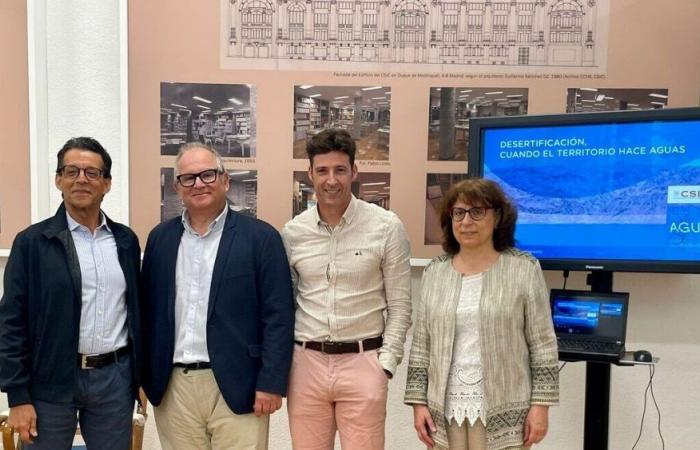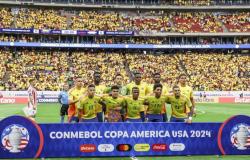The Water Economy Forum has presented this week in the CSIC scientific library the third installment of the “Water Writings” collection, focused on this occasion on the fight against desertification. Under the title “Desertification, when the territory leaks”, Its author is Jaime Martínez-Valderrama, postdoctoral researcher at the Arid Zones Experimental Station at the CSIC.
The presentation of the book took place in Madrid on the occasion of the commemoration of the World Day to Combat Desertification and Drought, which will be celebrated on June 17 with the motto “United for the Earth: Our legacy and our future.” Its objective is to raise public opinion and demonstrate that There are solutions and tools to combat desertification if we all cooperate. Furthermore, this year 2024 marks the 30th anniversary of the United Nations Convention to Combat Desertification.
According to United Nations data, up to 40% of the planet’s land areas are degraded, which directly affects half of the world’s population. The number and duration of drought periods has increased by 29% since 2000 and, if urgent action is not taken, droughts could affect more than three quarters of the world’s population by 2050.
To address desertification, Estanislao Arana, academic director of the Water Economy Forum, has advocated incorporating “hydrological planning criteria as a pillar to address desertification, since, although droughts and water scarcity are not the main cause of this phenomenon, “The scarcity of water increases the aridity of the land and its degradation.”
The expert has highlighted that the title of the book “when the territory leaks” enters squarely into the heart of the debate on sustainability in general and sustainability linked to water, in particular: “Using as an example the effect, natural or caused, of desertification, the book puts, once again, the conflict between development and the environment on the table,” he points out.
Neutrality of Degradation of the Land
The text reviews the conceptual and historical foundations of desertification and presents the avant-garde approach of Land Degradation Neutrality (NDT), which transcends both the climatic scope of desertification and the reforestation of ecosystems.
“This principle is based on territorial planning that tries to achieve a balance between the exploitation and conservation of the soil. In short, it is about taking advantage of the knowledge and technology available so that decision-making in water and soil resources management “Not only do they not aggravate the effects of this phenomenon of desertification, but they even contribute to its mitigation,” explained Lucía Pires, Director of Strategy and Content of the Water Economy Forum.
“The technique and research such as the one we present today and which includes, among others, the novel approach of Land Degradation Neutrality, must contribute to solving the challenge of preserving natural resources while meeting the needs of a growing world populationone of the great paradoxes of the 21st century, which translates into producing more with less,” adds Pires.
Bad management of the territory and degradation of resources water
The author of the publication, Jaime Martínez Valderrama, has highlighted that the book tries to clarify the ambiguities that surround desertification and that prevent effective solutions from being achieved. “Desertification is the degradation of arid areas, which cover almost half of the earth’s surface and three quarters of Spain. Despite being a major environmental problem and having a United Nations Convention to address it, land degradation is increasingly serious, putting our water and food security at risk,” he explains.
For Valderrama, “desertification is not the advance of the desert or something unexpected, but rather it responds to the poor management of the territory, driven by necessity or excessive ambition, as well as the degradation of water resources in arid areas.”
For his part, Carlos Mario Gómez, professor of Fundamentals of Economic Analysis at the University of Alcalá and member of the academic committee of the Water Economy Forum, has insisted that the importance of addressing desertification “as a critical and often ignored challenge, especially in the arid areas of the Mediterranean, just as the author of the book does.” The text “invites us to reflect and act in the face of this crisis, highlighting the crucial role of water as an economic resource that must be protected and managed in a sustainable manner,” he adds.
Although the circular economy has improved water use efficiency, it is not enough to stop land degradation and unsustainable trends. “Arid regions may exhibit the greatest technical efficiency in water use, but they continue to use more than is available, degrading water quality and becoming more vulnerable to climate change”Gómez noted.
The ‘Water Writings’ seek the dissemination of academic and scientific reflections, from a multidisciplinary perspective, on the sustainable and efficient management of the resource, with special emphasis on urban water management and its different connections with others. global challenges identified in the 2030 Agenda.






